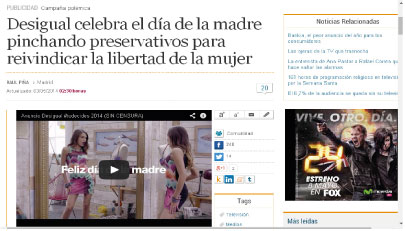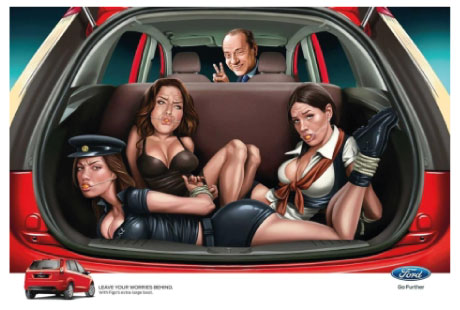
http://doi.org/10.15178/va.2018.142.97-107
RESEARCH
WHY ETHICAL ADVERTISING? THE MOST CONTROVERSIAL CAMPAIGNS
¿POR QUÉ UNA PUBLICIDAD ÉTICA? LAS CAMPAÑAS MÁS POLÉMICAS
PORQUE UMA PUBLICIDADE ÉTICA? AS CAMPANHAS MAIS POLÊMICAS
María Teresa Pellicer Jordá1 Professor at the University of Murcia Spain, she is the author of two books, entitled ‘Ethics and advertising strategies’ and ‘Advertising as a cultural industry.’ She is a specialist in advertising ethics, a topic that most of her more than 10 articles published in different journals in the field deal with.
1University of Murcia. Spain
ABSTRACT
The advertising is so important in the actually society. We depend on the advertising for doing a lot of activities in our life. Therefore, it’s very necessary an ethics advertising, especially a true advertising. The state of affairs allows advertising to be conducted by anyone, at any moment and without guaranties. The consumer is being increasingly bombarded by constant and contradictory advertising, making difficult to actually exercise a fair judgement on what, when and how to buy. In this situation, the right of the consumer are as threatened as the image of advertising itself. Lie, as a tool of debate is disrespected and banalized; and long term image is sacrified in spite of the short term, under the umbrella of commercial pseudo-philosophies. The consumer is constantly assaulted with phone and digital marketing, lacking new ideas and looking for easy solutions, instead of resorting to true creativity. We speak about this topic in this interesting article.
KEYWORDS: Ethics, advertising, society, marketing, consumer
RESUMEN
La publicidad tiene una gran importancia en la sociedad actual. Determina buena parte de nuestros actos y de nuestra forma de ser. De ahí la importancia de que ésta cumpla con las normas éticas, destacando de entre todas ellas la veracidad. El actual estado de cosas permite que la publicidad sea ejercida sin control por cualquier persona, en cualquier momento y sin garantías para el consumidor. Este, igualmente, se está viendo cada vez más bombardeado por información publicitaria constante y contradictoria, que hace difícil que pueda ejercer un juicio verdaderamente informado y sano con respecto a qué productos compra, como los compra y cuando. En esta situación, los derechos de los consumidores están tan amenazados como la imagen pública de la propia publicidad. Se pierde el respeto a la mentira como arma de convicción y se sacrifican los resultados a largo plazo a favor de tendencias cortoplacistas amparadas en pseudo-filosofías comerciales: se acosa al consumidor con marketing telefónico y digital, ante la falta generalizada de ideas y se buscan soluciones fáciles, en vez de acudir a la verdadera creatividad. En este artículo se ofrecen razones que sustentan estas afirmaciones y que permiten apostar por una verdadera ética publicitaria.
PALABRAS CLAVE: Ética, publicidad, sociedad, Marketing, consumidor
RESUME
A publicidade tem uma grande importância na sociedade atual. Determina boa parte dos nossos atos e de nossa forma de ser. Daí a importância de que esta cumpra com as normas éticas, destacando entre todas elas a veracidade. Neste artigo se oferecem razões que sustentam estas afirmações e que permitem apostar por uma verdadeira ética publicitária.
PALAVRAS CHAVE: Ética, Publicidade, Sociedade
Received: 02/07/2017
Accepted: 27/09/2017
Published: 15/03/2018
Correspondence: María Teresa Pellicer Jordá. maite.pellicer@um.es
How to cite the article
Pellicer Jordá, Mª T. (2018). Why ethical advertising? The most controversial campaigns [¿Por qué una publicidad ética? Las campañas más polémicas].
Vivat Academia, Revista de comunicación, nº 142, 97-107
doi: http://doi.org/10.15178/va.2018.142.97-107
Recuperado de http://www.vivatacademia.net/index.php/vivat/article/view/1005
1. INTRODUCTION
If we asked anyone how many ads they see throughout the day, it would be difficult to answer. We see many unconsciously, but it is really impossible to count them every day. Moreover, many of the ads we see, we do not remember them consciously, but their colors, shapes and badges remain stored in our minds unconsciously. Others do not achieve that purpose and pass by us almost unnoticed.
What is undeniable is the importance of this advertising in our daily lives. It determines a great deal of our acts and even our way of being and behaving. To paraphrase a famous phrase by Fernando Savater (1998, p.33) “this knowing how to live or art of living if you prefer” is what they call advertising. Savater finished this statement that we have changed for the word ‘ethics’. That art of living called it ethics, but we consider that it can be called advertising. Ethics and advertising coexist in a necessary and irremediable way. Why not then an ethic in advertising? This form of coexistence between both concepts is what has allowed, for example, Autocontrol to have already developed 17 codes, from so different commercial areas such as toys, medicines, alcoholic beverages or even a generic code on “brand defense”
Bonete has explained several times that ethics is what allows a commercial sector to put on a certain morality, which is an “unconditional defense of the dignity of man.” (1999: 28). That is another reason that supports the undeniable relationship between ethics and advertising, its respect for the consumer and for the citizen in general.
Sánchez Guzmán explains that, in order to sell, one must first inform about what is sold and convince, then, that it be bought, just as in order to defend a defendant, one must inform (1993: 19). The advertising message is, therefore, informative and persuasive at the same time. They are two dimensions that coexist and do not have to be opposed. Ethics derives from that first component, that of information, because information implies objectivity and truthfulness. For its part, the commercial function of advertising derives from that second persuasive element, which intends to sell before and better than the rest of the competitors.
That informative function is, as we say, the one that makes ethics necessary. As Arnold Toynbee (Hellín, 2006, p.76) argues, “the ethical attitude of the ad, conforms, in part, the ethics of our culture.” Apart from the debates on the crisis of ethical values in society, which has been stated, for instance, by Benavides (2004: 84), we must defend ethics in the professions, as Cortina points out (Cortina and Martínez, 1996, p. 23) and even more in advertising. As Valcárcel explains, “ethics and responsibility are inextricably linked. And when society is more benevolent in its criminal aspect, moral responsibility must be gaining ground (1998, p.154).”
But what exactly is the ethics that advertising has to fulfill? What would its fundamental principles be? And a third question, would it be possible to comply with it without affecting the sales target of advertising? The answer to these questions is the following: it is easy for advertising to tell the truth, which would be the fundamental ethical principle, which would encompass all the others. Truthfulness is the king principle and, yes, it should prevail in all ads. Reality, unfortunately, is not always that. For example, anti-wrinkle creams sell us a series of advantages or benefits that are not real. Moreover, a study by the OCU determined that “only (1) two of the 14 studied creams”, among which all the major brands that are advertised on television were included, really managed to have some effect on wrinkles. What was the reaction of the consumers when they learned that the creams in which they invested part of their money were a fraud and did not fulfill the promises of their advertisements? Disappointment was the word, to which not to buy that product again was added. As Marcuse explained “advertising is a service that guides the consumer (Moliné, 1973, p.127)”. But if, as in this case, it is erroneously oriented, only damages are generated, both for the consumer and for the manufacturer and for advertising as a profession in general. In fact, a large part of the announcements that breach the ethical norms, either due to lack of veracity or non-compliance with other fundamental ethical norms, are usually withdrawn in a short time. This is a clear loss for the advertiser, as well as a loss of money. We put the most famous examples of ads that, because of missing the ethical criteria, have been reported in Spain in the last five years (2010-2015). In almost all cases, these ads were removed.
(1) Website of the OCU. http://www.ocu.org/salud/cuidado-piel/noticias/mejor-crema-antiarrugas#. Retrieved on April 27, 2016.
2. ANALYSIS
1. Gourmet market in Seville (2015): This was an advertisement for the Lonja del Barranco, a business backed by two important figures of the country: the prestigious speaker Carlo Herrera and the famous bullfighter Fran Rivera. The ad jumped to the present because it proposed that the perfect plan was a boy and a drunken girl (after five drinks). Criticism was not slow to appear and there were several newspapers that echoed the announcement. Apologies from the company came somewhat late and, finally, the ad was removed.

2. Catalan Elections (2010): the announcement showed a girl to whom voting caused a great orgasm. The advertisement had the slogan ‘Voting is a pleasure’ and served to publicize an election in Catalonia, many of the political parties did not like it, which they considered offensive, like much of the population.

3. Hyundai and its ecological vehicle (2013): the advertisement showed a frustrated suicide. A man who tries to commit suicide in his garage for carbon monoxide poisoning. The protagonist failed in his suicide attempt because of the “100% water emissions”. The advertisement raised great indignation in the spectators and, in particular, in the blogger and copy Holly Brockwell, whose father had ended his life that way, a few years ago. The company apologized and withdrew the advertisement.

4. Neymar’s underpants (2013): just at the date on which the player Neymar signed for a football team in Spain, an advertisement starring him that outraged the gay community came to light. Neymar, in the ad, dances in front of a group of women, showing them his underwear. But when a man appears in the store, the sensual movements of the Brazilian soccer star disappear. Neymar flees the store as soon as another man enters. The company apologized but those apologies were not accepted by the gay community, which continued to consider the ad offensive to them.

5. Creditomás (2013): the microcredit company issued two ads that riled people in the Spanish society. In the first of them, it was said “in some countries of the world it is necessary to rent the uterus to get money. Luckily here we have Creditomás”. In the second ad, they said “in some countries of the world it is necessary to sell blood to get money. Luckily here we have Creditomás”. The use of these two resources outraged many Spanish associations, which considered it humiliating and cruel. The company did not respond to criticism.

6. Pastas Gallo (2013): the pasta company issued an ad in which the well-known television presenter was seen holding a package of ‘Gallo salads’ while stating “Buy salad with pasta rather than one made exclusively with fresh vegetables, because these wither soon.” After the denunciation by the Association of Users of Communication, Autoncontrol considered that this ad denigrated vegetables and that it was necessary to remove it. That is how it went.

7. Mother’s Day for Desigual (2014): the clothing brand issued an advertisement to mark Mother’s Day, in which a girl appeared pricking condoms. The Women’s Collective of the Workers Commissions union labeled it as “denigrating and sexist”, like many users of the networks.

8. The glasses of Bar Rafaeli (2014): The model starred in a spot that makes plump girls look rather bad. Only four days after it was launched, its withdrawal was requested. It was accused of selling the model as a sexual object and making fun of chubby girls.

9. The Victoria Beckham models (2015): The designer launched an advertising campaign of her clothes march, starring models that seemed to be “dead, zombies or drugged. This was claimed by the tabloids in the United States. The images were shocking.

10. Erotic poster of a party on Holy Wednesday (2015): The Institute of Family Policy of the Balearic Islands filed a complaint with the ODDM, the Women’s Institute and with the Delegation of Government in the Balearic Islands against the publicity of a party under the title ‘Holy Wednesday’ which shows erotic drawings of the Pope and a nun, among others, because it considers that it violates religious freedom, violates the rights of minors and denigrates women. They demanded its withdrawal, especially because it was posted in fences on public roads.

11. Ford and Berlusconi (2013): The Indian subsidiary of the automotive company Ford apologized, hours after the filtration of an ad model in the Asian country that presented a cartoon of Berlusconi in command of a car with three stunning barely dressed women tied in the trunk. The advertisement, which had been devised to promote the Ford Figo model and had not still been officially distributed or printed in newspapers, was posted for a few hours by the advertising agency JWT India on its website with other prototypes. It was a scandal.

3. DISCUSSION
This is why the truth as well as the rest of the ethical criteria must prevail in advertising. When the consumer feels cheated or hurt by a moral fault, he unleashes his fury and his bad comments on the product and on the brand. Maybe they do not reach the extreme of that Indian consumer who sued the AXE brand (2) because he had not managed to conquer any woman, as promised by the advertisement. But they can make the mark look bad.
(2) Retrieved on April 27, 2016.Periódico El Universal. Demanda a AXE porque no conquisto a chicas. http://archivo.eluniversal.com.mx/notas/635812.html. Consultada el 27 de abril de 2016.
As a final conclusion, we must emphasize that ethical advertising, governed by the truth, benefits all the parties that make up the advertising process: consumers, businessmen and publicists. Why not make ethics a rising value?
REFERENCIAS
1. Benavides-Delgado J (2004). La ética y los medios de comunicación en el ámbito de la cultura publicitaria: una aproximación conceptual. En Zamora JA, Medios de comunicación, información, espectáculo y manipulación. Navarra: Verbo Divino.
2. Bonete E (1999). Ética de la comunicación audiovisual. Madrid: Tecnos.
3. Hellín P (2008). El discurso publicitario contemporáneo: su relación con lo social. Murcia: Diego Marín.
4. Moliné M (1973). La publicidad. Barcelona: Edit. Salvat.
5. Sánchez-Guzmán JR (1993). Teoría de la Publicidad. Madrid: Tecnos.
6. Valcárcel A (1998). Ética contra estética. Barcelona: Crítica.
7. Savater F (1998). Ética para Amador. Barcelona: Ariel.